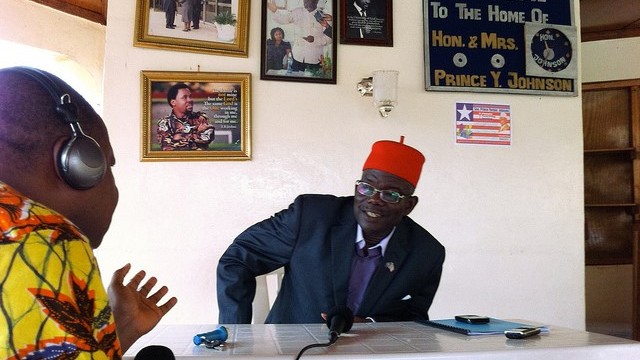Amid the encroaching sounds of rocket mortars and gunfire, a beacon of hope was birthed out of impossible circumstances. This is the story of Thomas Momo-Pujeh and his children.
Before the Liberian Civil War arrived in Monrovia, Momo-Pujeh and his family were living comfortable, middle class lives. With Momo-Pujeh working as a certified accountant and his wife employed as a secretary, their family enjoyed a measure of success with which they were content. That all changed as the NPFL soldiers advanced on Monrovia in the early 1990s.
During this time, fleets of ships were evacuating residents from the city. As the final ships were leaving the Freeport of Monrovia, many parents made the difficult decision to leave their children at the docks and flee to safety. Momo-Pujeh and his wife had recently taken in a few neighborhood children whose parents had fled or abandoned them as a result of the rebel encroachment.
When Momo-Pujeh’s daughter found out there were more children living at the Freeport, she took pity on them because they had not eaten for days. Her father agreed to take in the six children, at first just to feed them, and then to take them to someone else to provide long-term care.
However, after walking around the community day after day with the children, looking for someone to take them in – a family, an NGO, or a community group – Momo-Pujeh accepted that there was no one to take the kids, so he brought them back home.
He and the children were always seen walking in the community, and the word began to spread that Momo-Pujeh and his wife were caring for orphans and other abandoned children. People started dropping off children to his home for care.
With so many children to care for, he eventually ran out of food. By that time, he had 28 children under his care. Overwhelmed, frightened, and having his own wife and children to care for, Momo-Pujeh realized he needed to do something about the food shortage quickly.
The attacks on Monrovia drew closer and closer to where he, his family, and the children were sheltering. With no means of protecting the children and nearly out of food, Momo-Pujeh made the decision to approach the head of the rebel force occupying the area of Monrovia where he lived.
Prince Yormie Johnson, according to Momo-Pujeh, had a reputation for killing anyone he or his troops identified as a member of the Krahn ethnic group.

Prince Johnson, former rebel leader and now a senator. Photo: Ken Harper
This was a widely known fact and some of the children abandoned at the port had witnessed their loved ones murdered simply for being Krahn. As a result, many of the children refused to speak, for fear that speaking would reveal their tribe or that they would answer a question incorrectly and be killed.
To protect the children under his care, Momo-Pujeh gave the children Fula names to conceal their identities. Fearing that he was endangering the lives of the children he had vowed to protect and scared for his own life, Momo-Pujeh approached Prince Johnson.
Despite his insistent denial, Momo-Pujeh said Johnson knew that the children he was harboring were Krahn children, but for reasons unknown, he allowed them refuge and protection under his armed forces.
The rebel leader instructed Momo-Pujeh and his children to take shelter in a nearby church as he felt assured that opposing forces would not violate the sanctity of a church. Johnson also agreed to bring Momo-Pujeh and his children a bag of rice each day, which was delivered by his soldiers.
Once they moved into the church, people began bringing the elderly and other vulnerable people to be under the care of Momo-Pujeh and protection the rebels provided at the church. At one point there were up to 300 people under his care, but the Red Cross eventually relocated the elderly people and some children, leaving Momo-Pujeh and his wife caring for only 85 children by the end of 1990.
After a successful resettlement process occurred for some of the children and others were released to the care of Save the Children, the international NGO, Momo-Pujeh and his wife now had about 40 children remaining.
By this time opposing rebel forces began to advance on the town and Momo-Pujeh knew he needed to evacuate his family and children immediately. He once again called on Johnson to help facilitate a safe escape.
The children, Momo-Pujeh, and his family made it to the banks of a river on Bushrod Island, where Prince Johnson and his soldiers used canoes to transport them to the other side of the river. However since the canoes were so small and crossing the river was a lengthy process, only half of the children were able to reach the other side of the river.
The opposing forces were too close, so Momo-Pujeh and the other children were forced to run into the bushes to seek shelter away from the rebel fire. His wife had made it across the river with about 20 kids, and he had the remaining 20 to look after.
After nine months of figuring out how to survive with 20 children in the middle of a war, there was a temporary ceasefire. Up until this point, Momo-Pujeh’s family and the children who had escaped assumed he was dead.
After the temporary pause in combat, he and the children made their way to a Save the Children resettlement camp where word quickly spread that “Papa was alive.†Once reunited with all of his children and family, he finally accepted that these children were now his children and began to care for them as his own. However, he technically organized as an orphanage to make it easier to access resources.

Thomas Momo-Pujeh with his children. Photo: Amelia Bangura
After successfully securing land in Kebba Town and building a facility to house his family and his 40+ children, one of his partner organizations approached him about starting a school. The idea was to create this in conjunction with the orphanage since he already had a large group of children that needed schooling.
He agreed and in 2010 the Sis. Iye Orphanage and School System was created and opened to the public. Not only did the school provide consistent and quality education for his students, it also helped to offset the cost of caring for the orphans.
The school provides education for grades K–12 and vocational training in tailoring as well. The contract for the school included the partner NGO providing training and covering the cost of teachers’ salaries for six years. However, the contract expired at the beginning of 2016, and the school is seeking partners to help keep its doors open.
At the moment, Momo-Pujeh has to use the student’s tuition to try to cover salaries for teachers and administrators, which range from US$300 a month for the principal to US$100 a month for teachers.
Unfortunately, this takes away from the orphans having some of their basic needs met. The government only provides the orphanage US$15 per child every three months, and the remaining funding comes from private donors and NGOs.
Children are still brought to the Sis. Iye Orphanage for care, primarily through Save the Children, as well as through emergency care requests from government agencies. Occasionally, children are dropped off by individuals, which the orphanage reports to the Ministry of Gender and Social Welfare. The ministry, in turn, grants permission for the children to remain under the care of the orphanage.
Today, there are 54 children living and receiving education at the orphanage, with Momo-Pujeh and his wife still caring for them.
“One of my proudest joys in this world is that the children who were raised by my wife and me in this orphanage refer to me as their Pa. That is why I do what I do,†Momo-Pujeh said.
Individuals or organizations interested in supporting the Sis. Iye Orphanage and School can contact Thomas Momo-Pujeh at sisiyetom@gmail.com.



